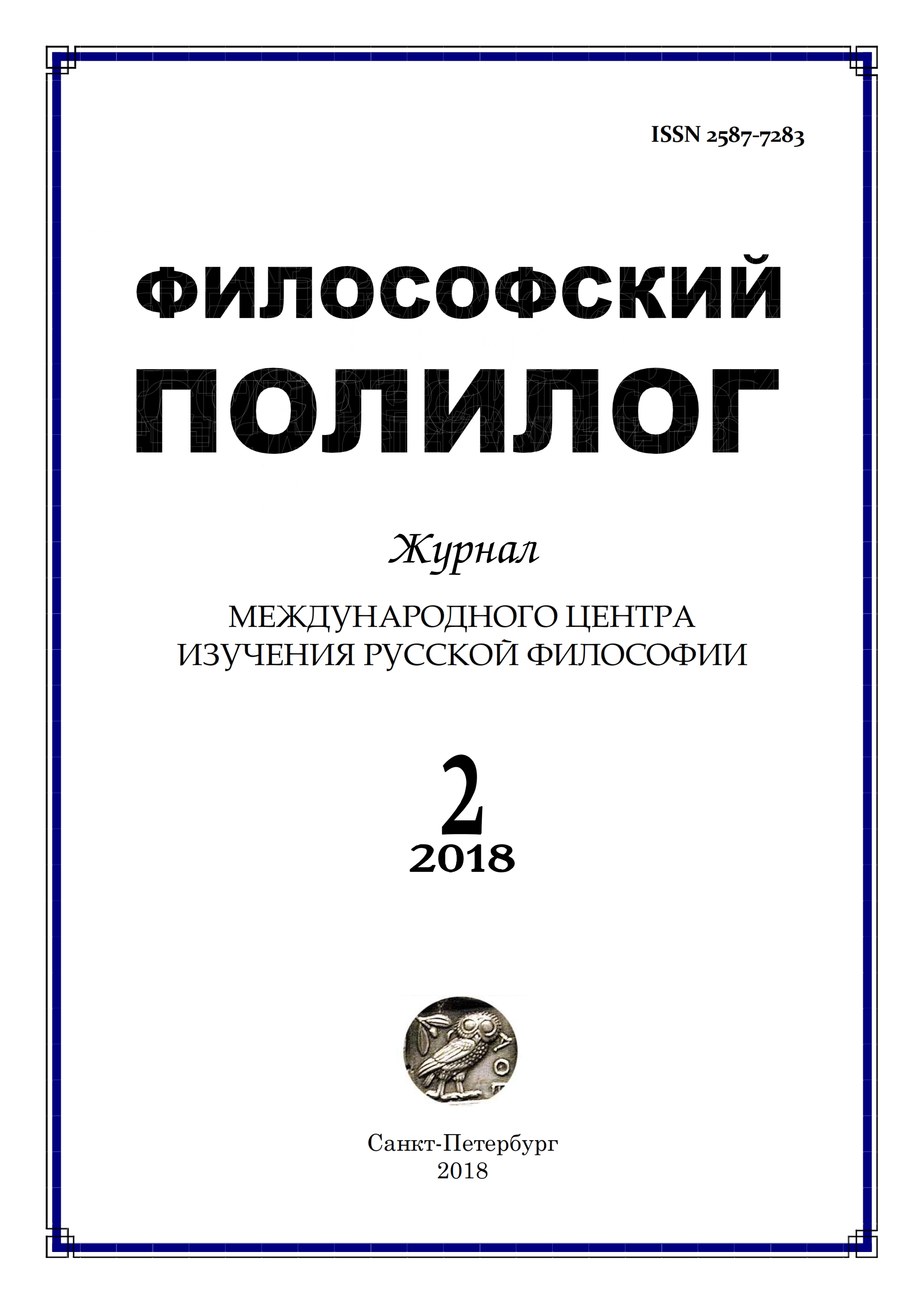The GULAG cycle as the philosophical last will of Karsavin
Abstract
The cycle of philosophical and poetical-philosophical texts written by Lev Karsavin in 1949–1952 before his death in the concentration camp Abez in the Polar Urals is interpreted as the final integrating result of the work of the philosopher summing up all the leitmotifs of his thought. It is shown that the integrating principle of the cycle is the conception of deification, which was the central conception of the Orthodox theology since the Patristic Age. For this reason the analysis of the GULAG cycle is performed in the comparative perspective, by means of the comparison to the patristic conception as presented, in the first place, by st. Maximus the Confessor. The personological aspect is put to the forefront: it is reconstructed how man’s personality is changed in the course of the deification described by Karsavin as “ontological drama” embracing both the world and God. This aspect makes us draw attention to the concluding stages of the deification, at which all the cosmos becomes involved into the deifying transfiguration. St. Maximus describes the cosmic dimension of the deification on the basis of the idea of “cosmic liturgy”, which establishes a profound connection between the deification of the cosmos and the ecclesiastic phenomena of the liturgy and the Eucharist. It is argued that the conception of deification in the GULAG cycle is generally in accordance with the patristic idea, although it does not include some of its essential elements. Some distinctive features of Karsavin’s conception such as his treatment of death, perfection and the apogee of development are also discussed.
References
In memory of L. P. Karsavin], Brussels: Zhizn' s Bogom, 1990.
Karsavin, L.P. Venok sonetov [A wreath of sonnets], in Vaneev, A.A. Dva goda v Abezi. V pamyat' o L. P. Karsavine [Two years in Abez. In memory of L. P. Karsavin], Brussels: Zhizn' s Bogom, 1990.
Karsavin, L.P. Kommentariy k Venku sonetov i Tertsinam [Commentary on the Wreath of sonnets and Terza rima], in Vaneev, A.A. Dva goda v Abezi. V pamyat' o L. P. Karsavine [Two years in Abez. In memory of L. P. Karsavin], Brussels: Zhizn' s Bogom, 1990.
Karsavin, L.P. O bessmertii dushi [About the immortality of soul], in Vaneev, A.A. Dva goda v Abezi. V pamyat' o L. P. Karsavine [Two years in Abez. In memory of L. P. Karsavin], Brussels: Zhizn' s Bogom, 1990.
Karsavin, L.P. O molitve Gospodney [On the Lord’s prayer], in Vaneev, A.A. Dva goda v Abezi. V pamyat' o L. P. Karsavine [Two years in Abez. In memory of L. P. Karsavin], Brussels: Zhizn' s Bogom, 1990.
Karsavin, L.P. Osnovnye tezisy metafizicheskogo miropoznaniya [The main theses of metaphysical world knowledge], in Karsavin, L.P. Sochineniya [Works], Moscow: Raritet, 1993.
Karsavin, L.P. O sovershenstve [About perfection], transl. from Lithuanian by A. Kovtun, in Bogoslovskie trudy [Theological works], 2004, vol. 39.
Karsavin, L.P. Sv. Ottsy i uchiteli Tserkvi. Raskrytie Pravoslaviya v ih tvoreniyah [St. Fathers and Teachers of the Church. Demonstration of Orthodoxy in their works], Paris: Y.M.C.A.-Press, 1926.
Karsavin, L.P. Tertsiny [Terza rima], in Vaneev, A.A. Dva goda v Abezi. V pamyat' o L. P. Karsavine [Two years in Abez. In memory of L. P. Karsavin], Brussels: Zhizn' s Bogom, 1990.
Maximus the Confessor, Tvoreniya [Works], Book 1, Moscow: Martis, 1993.
Khoruzhy, S.S. Issledovaniya po isikhastskoy traditsii [Hesychast tradition studies], vol. 1, St. Petersburg: RCGA Publishing House, 2012.
Khoruzhy, S.S. Filosofiya Karsavina v sud'bah yevropeyskoy mysli o lichnosti [Philosophy of Karsavin in the fate of the European idea of personality], in Lev Platonovich Karsavin [Lev Platonovich Karsavin], Moscow: ROSSPEHN, 2012.

